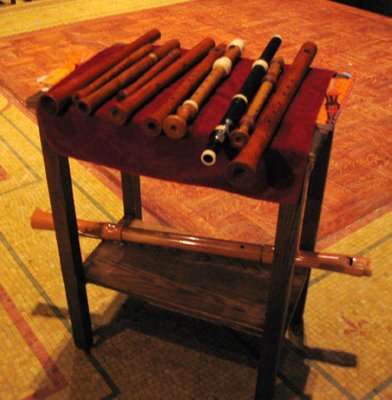 After a concert on Monday night with Modern Musick, recorder virtuoso Matthias Maute was back at St. Mark's Episcopal Church on Capitol Hill, where the Washington Early Music Festival is in residence all this week. As Keith Reas, the director of music at St. Mark's put it in his brief introductory remarks, this was a solo recital, nothing but "a man and a table full of recorders." Does anyone really want to hear two hours of recorder music and nothing but one man playing a recorder, or rather twelve of them? If anyone could make this work, I felt sure, it was Matthias Maute, whose praises I have sung before. Whenever I like a performer's playing this much, that music critic voice in my head starts accusing me of complacency, lazy listening, being a fan. So I took Mrs. Ionarts, a flutist and one-time teacher of the recorder to children, along last night to hear him play. She was just as impressed as I have been.
After a concert on Monday night with Modern Musick, recorder virtuoso Matthias Maute was back at St. Mark's Episcopal Church on Capitol Hill, where the Washington Early Music Festival is in residence all this week. As Keith Reas, the director of music at St. Mark's put it in his brief introductory remarks, this was a solo recital, nothing but "a man and a table full of recorders." Does anyone really want to hear two hours of recorder music and nothing but one man playing a recorder, or rather twelve of them? If anyone could make this work, I felt sure, it was Matthias Maute, whose praises I have sung before. Whenever I like a performer's playing this much, that music critic voice in my head starts accusing me of complacency, lazy listening, being a fan. So I took Mrs. Ionarts, a flutist and one-time teacher of the recorder to children, along last night to hear him play. She was just as impressed as I have been.| Available at Amazon: Shades of Red (Vivaldi concerti), Matthias Maute, REBEL Ensemble (released on May 31, 2005) |
This was balanced by four selections by blind carilloneur and recorder virtuoso Jacob van Eyck from Utrecht. The first two pieces were variation sets on Italian melodies, including a fascinating setting of Caccini's Amarilli mia bella, probably the most famous monody in his Le nuove musiche (1601). Maute was actually able to play harmonies by simultaneously humming and playing his bass recorder on this piece. Maute claimed that his "favorite melody" by van Eyck is one he played, Doen Daphne d'over schoone Maeght, which van Eyck contorts into remarkably difficult variations. Maute then turned the end of Engels Nachtegaeltje, a song describing the twittering of nightingales, into a joke as his birdsong merged with a recorded track of birds.
Charles T. Downey, Modern Musick and Matthias Maute (June 20) Jens F. Laurson, Cavalli, "La Didone" (June 18) Charles T. Downey, Mozart, "Idomeneo" (June 4) |
In this performance, Maute went less for the programmatic nature of the music -- there was no barking dog here in the second movement, a sound Vivaldi gives to the hapless viola -- although again his evocation of the birdsongs of the first movement, not to mention the murmuring breezes, was nice. However, this piece was the least successful of the evening, with Maute showing the one weakness of his phenomenal technique, when he was not playing a recorder. The concert closed on another superlative performance, a recorder adaptation of Bach's partita for solo flute, composed for the transverse flute. This complex and rewarding piece, played regularly by Mrs. Ionarts and every other flutist on the planet, sounded vivid and new in Maute's hands. It was a shame that more people did not come out to St. Mark's to hear this exceptional concert.
No comments:
Post a Comment